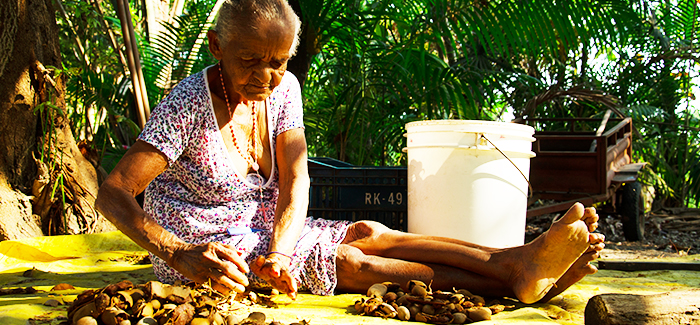Brazil is a great laboratory for studying indigenous and community enterprises that support forest conservation and community development. It has abundant and diverse indigenous and community projects and enterprises across the Amazon.
As part of an initiative to foster the growth of these enterprises, EDF catalogued as many examples as we could find and used the Canopy Bridge Atlas to map indigenous enterprises in the Amazon Basin. We selected three cases to investigate further, which are unique in different ways, but face similar challenges.
 An indigenous woman of the Xingu Seed Network at work | Photo courtesy: Tui Anandi and Danilo Urzedo (ISA)
An indigenous woman of the Xingu Seed Network at work | Photo courtesy: Tui Anandi and Danilo Urzedo (ISA)
By studying the three cases, we found that:
- Securing operating and sanitary licenses from the government has been the most significant challenge for the enterprises due to bureaucratic hurdles. They either are currently experiencing problems in obtaining these licenses or encountered significant problems in the past.
- Government is also a key source of initial and steady demand, either directly or indirectly, of the products of these enterprises.
- The enterprises have partnered with allies for technical assistance, start-up funding, and/or continuing funding, in order to scale and maximize impacts.
The Babassu Nut Collecting Cooperative
The Cooperativa Interestadual das Mulheres Quebradeiras de Coco Babaçu (CIMQCB) is a decentralized cooperative formed by women from forest communities who collect and process babassu nuts in Brazil. CIMQCB sells its main products, babassu nut soap, oil, and flour, to various types of local, regional, and national customers.
While obtaining sanitary licensing from the government has been an obstacle for CIMQCB to accessing some markets, the federal government’s school food acquisition program is also a consistent and large client for one of its sub-groups.
Partnerships with foreign development programs have been essential for its organizational development. The European Union and the German Development Bank were some of its first donors. Currently, the cooperative receives supports from the Program of Small Ecosocial Projects.
The Jupaú indigenous people, also known as Uru-Eu-Wau-Wau, who were officially contacted for the first time forty years ago. Their traditional processing techniques create a unique flavor and have attracted significant demand for their product.
However, the Jupaú are not formally organized as a business and are faced with the challenge of meeting sanitary and business regulations as well.
To help them overcome the challenges, Kanine, a local non-profit, is working with the Jupaú to find a culturally appropriate manner to increase their production and secure appropriate licenses from the state, while maintaining their unique and traditional processing that makes their product special.
The Xingu Seed Network (RSX) was officially established in 2007 by an association of individuals and organizations working on community development in the Xingu River region. The network sources seeds for 200 different native species that are used for reforestation in the Amazon and Cerrado regions. In RSX, indigenous women are the majority of the seed collectors and the activity is an important source of income for them.
Financial and technical support from donors has played a key role in RSX’s growth. It is on the pathway to financial sustainability from its seed sales ($95,000 in 2015).
Similar to the other cases, business regulations and obtaining the proper licenses have been challenging for RSX. The Brazilian Forest Code drove a significant amount of early demand for their seeds, recent changes to it depressed demand.
Overcoming bureaucratic licensing hurdles, finding right partners, connecting with government programs, and complying with government regulations are the key challenges and opportunities the enterprises highlighted here and many others face.
In the future, EDF and our partners will continue to work with these indigenous and community enterprises throughout the Amazon to help them to overcome the challenges, scale their businesses, and maximize their impacts. There is still much to be done to conserve what is left of the Amazon forest.
By Chris Meyer
Enviroshop is maintained by dedicated NetSys Interactive Inc. owners & employees who generously contribute their time to maintenance & editing, web design, custom programming, & website hosting for Enviroshop.
